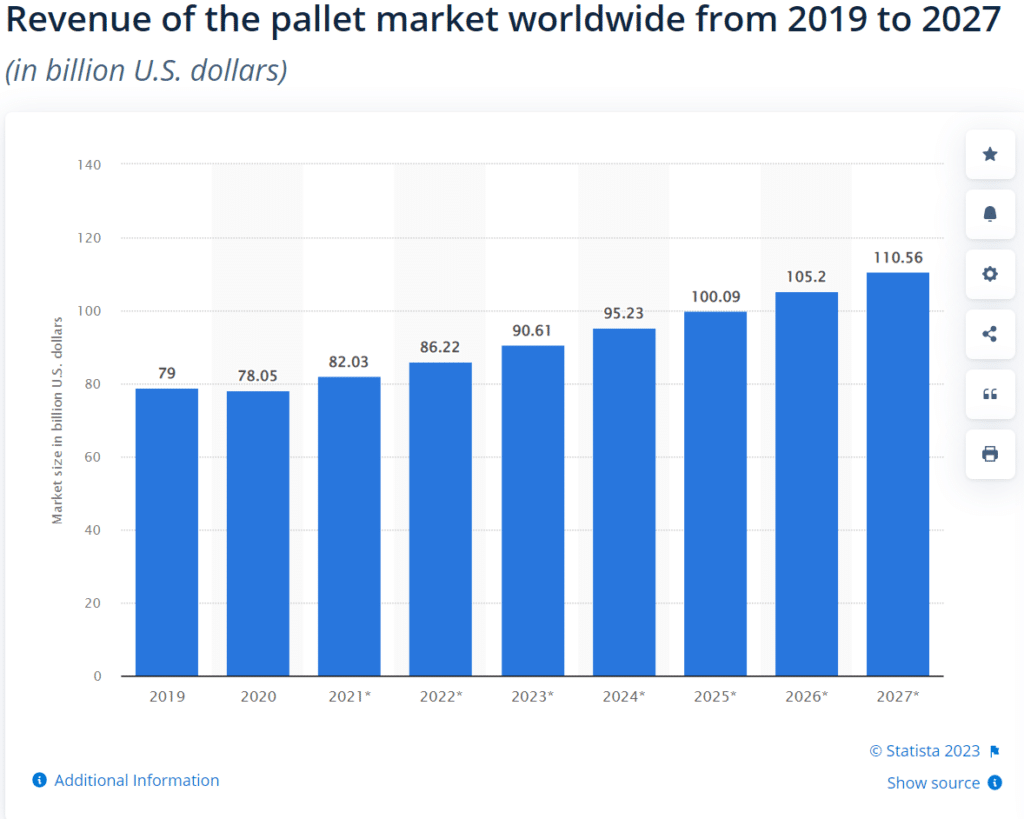Wooden pallets are one of the most used objects on earth.
By the numbers, pallets can be reused up to 20 times, and once they reach end-of-life, they can be converted to biomass, animal bedding, mulch, and more.
33% of all Wooden Pallets are now exported to Asia
As reported in Friday Offcuts, Asia, represented by Japan and South Korea, has continued to grow import volumes at the expense of European buyers and, in the last quarter of 2022, accounted for one-third of the world’s import volume, up from only 18% five years ago.
Demand for biomass, including wood pellets, has increased remarkably quickly in Japan, from 1.0 million tons in 2018 to 4.4 million tons in 2022. The upward trend is expected to continue, and Japan will be the fastest-growing market in the world in the next 5-10 years.
Vietnam is currently the primary pallet supplier to Japan, followed by Canada and the US.
With Japanese power companies writing long-term offtake agreements with larger suppliers in North America, the most considerable pallet supply expansion in the coming years will likely be in the US and Canada.
The global market for wooden pallets did not grow in 2022
The report, provided by Wood Resources International, advised that the trade of wood pellets remained unchanged year-on-year, with about 29 million tons in 2022.
This year was the first time shipments failed to rise year-on-year since 2017 when wood pellets became a globally traded commodity.

This data contradicts earlier research where the global pallet market (approximately 5 billion) was expected to grow by 40% over the next 5 years.
Pellet producers in the USA have historically shipped all their production to European power companies, and as late as 2021, there were no exports from the US to Asia.
However, in 2022 Asian demand picked up, and in the 1Q/23, 10% of the total volume from the Southern states was shipped to Japan.
This recent and sudden change in trade flow will likely continue to expand, with increasing long-term sales to Japanese power companies and a declining share of European shipments.
New research shows that Wooden Pallets are ‘climate positive’
The data comes as emerging research from the USA shows that pallets, like most forest products, can go beyond net-zero carbon emissions and achieve ‘climate positive’ outcomes – creating an environmental benefit by removing carbon dioxide from the atmosphere.
Net-zero is a popular benchmark for ESG reporting, with several countries including the benchmark n their Nationally Determined Contribution (NDC’s).
In September 2022, US consultancy McKinsey reported that a ‘materials transition’ towards low-carbon ‘circular’ materials is instrumental in achieving the net-zero agenda.
Pallet pooling is a share-and-reuse model – effectively a car-pooling service – where pallets are shared among producers, manufacturers, distributors, retailers, and transporters.
All things considered wooden pallets are the most sustainable option
The research coincides with 2020 research published by Penn State University confirming that wooden pallets are more environmentally friendly and sustainable than those made from plastics.
Settling a debate that has raged for decades, the researchers concluded that wooden pallets were more sustainable over a single-trip journey as well as over a 100,000 trip-journey.
According to Chuck Ray, head researcher and associate professor of ecosystem science and management in the Colle of Agricultural Sciences:
“Few people realize the significance of this issue — there are about 700 million pallets produced and recycled each year in the United States alone”. Ray continues. “Because I have worked my whole career in the wood products industry, I have gained a special appreciation for the benefits of wood as an environmentally friendly product.”
Prioritise recycling and pallet pooling over new wooden pallets
According to Dr. Henry Quesada, professor at the Virginia Tech Department of Sustainable Biomaterials, the answer lies with greater collaboration within the supply chain.
“New wooden pallets (made of 100% new wood) have a clear disadvantage compared to recycled or pooled pallets in regard to their environmental impact,” he states.
“Recycled pallet manufacturers do more with less,” he continues. “Pallet recyclers need to develop an extensive network of suppliers of used wooden pallets for them to properly operate.”
“But the wood products’ industry in general is still failing to properly communicate the benefits of using renewable materials and applying circular economy principles to their products and processes.”






